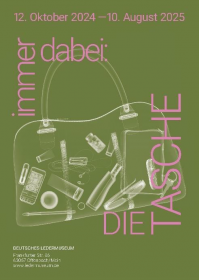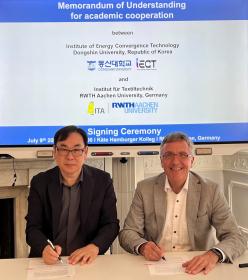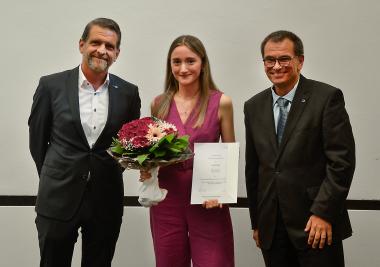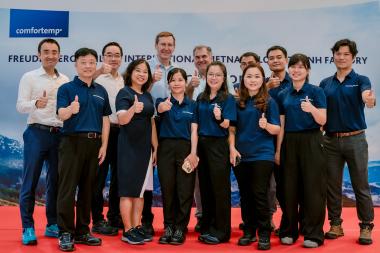
Startseite
Highlights
Jobs
Unternehmen und Headhunter suchen ...
CHT Switzerland AG: Teamleiter Anwendungstechnik Duck (m/w/d)
NEU: Geschäftsführer (m/w/d) - Textilveredlung
Stellvertretende Exportleitung (m/d/w) - Heimtextilien
Vertriebsleitung (m/w/d) - Technische Textilien / Reinigung & Hygiene
Geschäftsführer / General Manager (w/m/d) - Technische Textilien
Objektberater:in (m/w/d) - Hamburg/Norddeutschland
Key Accountant Manager (m/w/d) - National + International Technische Textilien
News
Unternehmen und Märkte

BTE schätzt, Shein, Temu & Co haben 2023 eine Mrd. Modeartikel und Schuhe in Deutschland verkauft
Der BTE schätzt, dass die Verbraucher in Deutschland im letzten Jahr rund eine Milliarde Bekleidungsstücke und Schuhe bei außereuropäischen Anbietern und Plattformen wie Shein und Temu gekauft haben. Das hat eine Analyse der vorläufigen Außenhandelsstatistik ergeben, wonach die Inlandsmenge (Import minus Export) von Bekleidung und Schuhen 2023 gegenüber dem Vorjahr dramatisch gesunken ist. Dies ist für den BTE nur mit einer hohen Zahl von Direktimporten der Verbraucher aus Asien erklärbar, die nicht in der Außenhandelsstatistik berücksichtigt werden.
So lag im Jahr 2023 das amtlich ermittelte Inlandsangebot bei 3.514 Millionen Bekleidungsartikeln und 266 Millionen Schuhpaaren. 2022 waren es noch 4.457 Millionen Bekleidungsstücke und 413 Millionen Paar Schuhe. Rein statistisch ist das entsprechende Angebot für die Verbraucher binnen eines Jahres also um 1.090 Millionen Artikel oder 22,4 Prozent gefallen. Die geringe inländische Produktion blieb dabei unberücksichtigt.

Verdopplung der Fläche: LFDY baut Lagerlogistik aus
Mit einem neuen, modernen Lagergebäude im Herzen Düsseldorfs konsolidiert die Düsseldorfer Streetwear-Brand LIVE FAST DIE YOUNG ihre bisherigen Standorte zu einem zentralen Hub.
Das neue Lager bedeutet nicht nur eine Verdopplung der Fläche, sondern führt auch die beiden bisherigen Logistikeinheiten an der Königsberger Straße 100 und in Heerdt unter einem Dach zusammen. Auf insgesamt 9.900 m² wird zukünftig der gesamte logistische Warenfluss des Streetwear-Labels abgebildet – von der Warenannahme und Qualitätskontrolle über das B2C- und Retail-Fulfillment bis zur Retourenabwicklung und -aufbereitung.
Das neue Gebäude erfüllt hohe ökologische und operative Standards. Mit Photovoltaikanlagen zur Eigenstromversorgung, 16 modernen Verladetoren und einer Bürofläche von 800 m² ist das neue Lager ein Gebäude für die Logistik der Zukunft.
TEXOVERSUM-Studierende auf der Fashion Week
Studierende des Studiengangs Fashion & Textile Design und Graduierende der TEXOVERSUM Fakultät Textil der Hochschule Reutlingen waren Teil von zwei Fashion Shows im Rahmen der Neo.Fashion. auf der Berlin Fashion Week. Die Entwürfe bewegten sich spielerisch zwischen Klassik und Avantgarde, mal puristisch, mal opulent.
Seit 2020 präsentieren Reutlinger Graduierende ihre Abschlusskollektionen auf der Neo.Fashion., Deutschlands größtem Graduate Fashion Event, das während der Berlin Fashion Week den besten deutschen Modedesignabsolvierenden eine Plattform bietet, um sich einer breiten Öffentlichkeit zu präsentieren. Dieses Jahr war die TEXOVERSUM Fakultät Textil als einzige Hochschule mit zwei Shows im Atrium Tower am Potsdamer Platz vertreten.
Am ersten Tag der Neo.Fashion. überzeugten Deviana Brobeil, Jan Dam, Marielou Gunzert, Jing-Jie Huang, Johanna Knürr, Antonia Mayer, Dominic Rauh, Viola Schmidt und Armin Wehrmann das Berliner Publikum mit ihren Abschlusskollektionen in einer aufmerksamkeitsstarken Show.

Decathlon-Produkte in 3D
Decathlon kündigt die Einführung von drei innovativen neuen Apps an, die für Apple Vision Pro entwickelt wurden.
Die neuen Apps zielen darauf ab, das Erlebnis für Apple Vision Pro-Nutzer und Decathlon-Kund:innen zu verbessern. Dabei werden Decathlon-Produkte in 3D und in realer Größe in ihrer gewünschten Umgebung visualisiert, die Geschichten hinter den Produkten erzählt und Kaufoptionen aufgeführt.
Die erste App mit dem Namen Decathlon ist im Shopping-Bereich der Apple Vision Pro in Frankreich, Deutschland und Großbritannien verfügbar. Die App ermöglicht es den Nutzern, im Online-Katalog von Decathlon zu stöbern und die richtigen Produkte für ihre sportlichen Abenteuer zu kaufen.
Die zweite App, Decathlon Innovation, die in Großbritannien und Frankreich gestartet wurde, stellt die neuesten Produkte vor und bietet den Nutzern ein tieferes Verständnis der technologischen Fortschritte hinter ihren Lieblingssportgeräten.
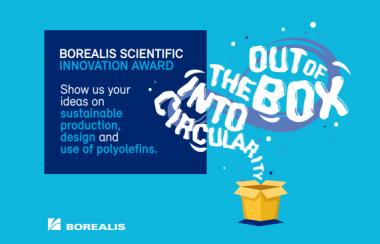
Aufruf für Borealis Scientific Innovation Award
Die Verwirklichung der Vision von Borealis, durch innovative Lösungen für Kunststoffe und Basischemikalien eine nachhaltige Transformation herbeizuführen, um eine vollständig kreislauforientierte Zukunft zu schaffen, erfordert neues Denken. Mit den Borealis Scientific Innovation Awards (BSIA) bietet Borealis eine Plattform für Ideen, die den Kreislaufwandel beschleunigen und fördert das Engagement, das notwendig ist, um nachhaltigen Fortschritt voranzutreiben.
In diesem Jahr zeichnet der BSIA Publikationen oder Dissertationen (Publikationen, Bachelor, Master, PHD, Postdoc) aus, die eine innovative Idee im Bereich neuer Lösungen für die nachhaltige Produktion und Verwendung von Kunststoffen beschreiben. Dazu gehören z.B. neue Katalysatoren, energieeffiziente Polymerisationsverfahren, Recycling von Polymeren und Polymer-Materialien für die Energietransformation.
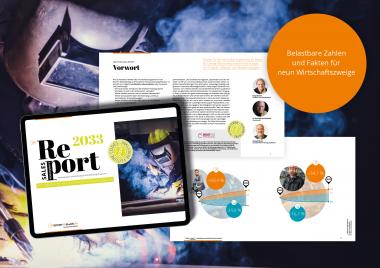
Marketmedia24: Sales Performance-REPORT zu Berufskleidung und Persönliche Schutzausrüstung
Wie die gesamte Textilbranche, stehen auch die Akteure im Bereich der Berufs- und Schutzkleidung sowie der Corporate Wear vor großen Herausforderungen. Zum einen müssen freiwillige und gesetzlich verankerte Nachhaltigkeitsziele in kurzer Zeit umgesetzt werden, zum anderen befinden sich die wichtigsten Abnehmerbranchen in einem nie gekannten Transformationsprozess mit ungewissem Ausgang. In Zeiten, in denen sich ganze Industriezweige neu aufstellen oder sogar neu erfinden müssen und sich die Gastronomie, die Hotellerie sowie die gesamte Pflege- und Gesundheitsbranche stark wandelt, ist es nicht nur ein „nice to have“ sondern ein „must have“, detaillierte Erkenntnisse über die zukünftige Entwicklung der Absatzmärkte zu haben.
Marketmedia24, Köln, bietet im neuen Studienformat „Sales Performance-REPORT" diese wichtigen Erkenntnisse. In Kooperation mit der Vereinigung MaxTex, Frankfurt, wurden zwischen Dezember 2023 und April 2024 über 30 Branchen-Expert*innen in zwei Befragungswellen interviewt.

BVMed: Neue Vorschriften zur Cybersicherheit für Medizinprodukte
Auf die Hersteller von Medizinprodukten kommen neue Vorschriften zur Cybersicherheit zu, über die der Bundesverband Medizintechnologie (BVMed) mit einem neuen Informationsblatt informiert. Grundlage ist die europäische NIS-2-Richtlinie (Netzwerk- und Informationssicherheit) aus dem Jahr 2023, die deutliche Verschärfungen der EU-Vorschriften zur Cybersicherheit enthält. Sie muss bis 17. Oktober 2024 in nationales Recht umgesetzt werden. Seit Ende Juni 2024 liegt dazu in Deutschland der vierte Referentenentwurf zu einem NIS-2-Umsetzungs- und Cybersicherheitsstärkungs-Gesetz (NIS2UmsuCG) vor. Das BVMed-Informationsblatt zu den neuen Anforderungen an die Cybersicherheit, das in Zusammenarbeit mit der Kanzlei Reusch Law erarbeitet wurde, kann unter www.bvmed.de/cybersicherheit heruntergeladen werden.
Mit der NIS-2-Richtlinie werden die Anforderungen an die Cybersicherheit in der Medizinprodukte- und In-vitro-Diagnostika-Branche deutlich verschärft. Betroffen sind dabei Unternehmen ab 50 Beschäftigten oder einem Jahresumsatz von über 10 Millionen Euro. Aus den Vorgaben der NIS-2-Richtlinie ergeben sich unter anderem folgende Anforderungen:
STOLL: Erfolgreiche Teilnahme an der 95. Pitti Filati
STOLL war auch auf der diesjährigen Pitti Filati mit einem Stand vertreten. Der Flachstrickmaschinenspezialist der KARL MAYER GROUP präsentierte seine neue Trendkollektion NOCTURNO und Entwicklungen von STOLL ITALIA, die in Zusammenarbeit mit dem Garnhersteller IAFIL Industria Ambrosiana Filati S.p.A. entstanden waren. Auf Nachfrage wurden die digitalen Softwareprodukte der CREATE-Familie vorgeführt.
Neben seiner Beteiligung als Aussteller leitete STOLL im Verbund mit drei weiteren Unternehmen das Projekt „Training Days“ der Pitti Filati zur beruflichen Entwicklung von Fachkräften.
Der Messeauftritt von STOLL auf der diesjährigen Pitti Filati wurde von seiner Niederlassung STOLL ITALIA organisiert und war ein voller Erfolg.
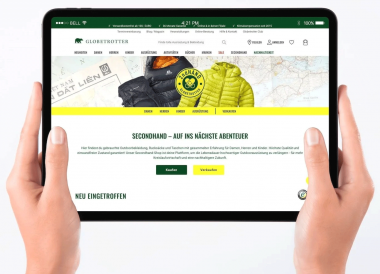
Globetrotter: Neuer 2nd Hand Online-Shop
Egal ob Regenjacke, Wanderrucksack oder Funktions-Shirt: Der Kauf gebrauchter Ausrüstung und Bekleidung schont nicht nur den Geldbeutel, sondern auch die Umwelt. Der Hamburger Outdoor-Ausrüster Globetrotter will mit seinem neuen 2nd Hand Online-Shop ab sofort nachhaltigeres Shoppen noch einfacher gestalten.
Für die Globetrotter Kund:innen ergeben sich durch das neue Shop-Konzept zahlreiche Vorteile: „Zuallererst betreiben wir unseren neuen Shop vollständig in Eigenregie. So können wir unsere ganze Expertise in den An- und Verkauf von gebrauchter Outdoor-Ausrüstung einfließen lassen“, erklärt Philipp Gramse, der als Product Lifecycle Manager die Umsetzung vorangebracht hat. „Außerdem ist 2nd Hand nun in unser eigenes Shop-System eingebunden. Dadurch werden gemischte Warenkörbe aus unserem regulären und unserem Gebraucht-Sortiment möglich.”

Düsseldorf Fashion Days Festival Edition am 27. Juli
Mode, Beauty, Lifestyle: Unter der Dachmarke Düsseldorf Fashion Days (DFD) richtet die Wirtschaftsförderung Düsseldorf am Samstag, 27. Juli, erneut eine Festival Edition aus. Das Format findet im Rahmen der Kollektions-Ordertage statt, zu denen die Modebranche die kommende Saisonware anbietet. Im Gegensatz zu den Modemessen und Präsentationen in über 600 Showrooms, bei denen Geschäftsbeziehungen im Vordergrund stehen, spricht die Festival Edition Endverbraucherinnen und -verbraucher an.
"Mit der Festival Edition haben die Wirtschaftsförderung Düsseldorf und das Fashion Net Düsseldorf ein wichtiges Format geschaffen: Das Event ist frei zugänglich, lädt zum Mitmachen ein und nimmt gezielt die Konsumentinnen und Konsumenten sowie den Einzelhandel in den Blick. Wir freuen uns auf viele Modeinteressierte, die sich inspirieren lassen und die Modemetropole Düsseldorf an diesem Tag hautnah und in Aktion erleben", sagt Wirtschaftsdezernent Christian Zaum.
Business
Normen & Standards
Fraunhofer: Positionspapier Normen & Standards
Studie - Lieferkettengesetz
HypoVereinsbank: Wettbewerbsnachteile durch Lieferkettengesetz
Fast drei Viertel der Befragten (70%) befürchtet, dass die Überwachung der gesamten Lieferkette den Mittelstand – insbesondere kleine Unternehmen – überfordern könnte.
Infos zum Download der Studie in unserem Newsbereich.
Good
to Know
TexCampus
TexCampus – die
Wissensdatenbank für
Forschungspublikationen
F & E ist ein entscheidener Wettbewerbsfaktor.
Erfahren Sie so früh wie möglich, woran die Forschungslandschaft arbeitet..
Finden Sie schnell und gezielt Informationen in unserer Online-Datenbank.
Profitieren Sie vom Zeitvorteil: Abschlusberichte, wissenschaftlich-technische Dokumentationen und redaktionelle Beiträge zu Forschungsprojekten 24/7 verfügbar.
Bleiben Sie informiert über die Innovationen in Ihrer Branche.
Kontaktieren Sie uns gern per Mail, wenn Sie ein Teil von TexCampus werden möchten.
DaunenCheck
Willkommen bei DaunenCheck
Und sollten Sie doch einmal einen Beitrag vermissen: wir freuen uns auf Ihre Mail an daunencheck@textination.de.
Zahlen & Statistik
Konjunkturdaten Textil & Bekleidung
Monatlich aktualisiert erhalten Sie hier die Konjunkturdaten zur deutschen Textil- und Bekleidungsindustrie:
- Auftragseingangsindex
- Umsatzindex
- ifo-Konjunkturklimaindex
- Kennziffern
Industrie-Statistiken finden Sie in unserer Datenbank zum Download.


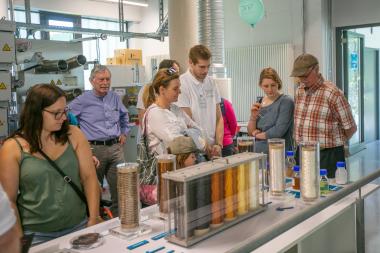
 Sustainability
Sustainability


